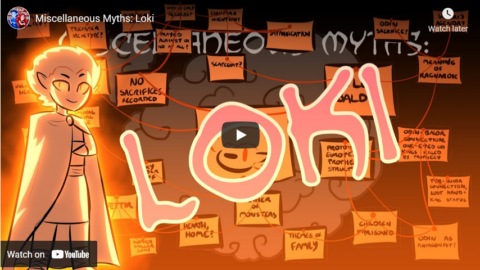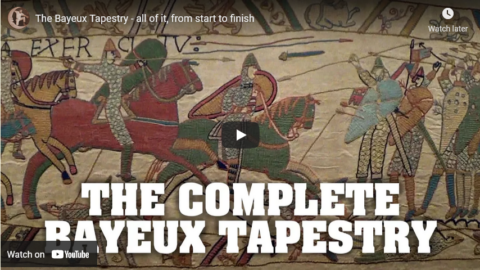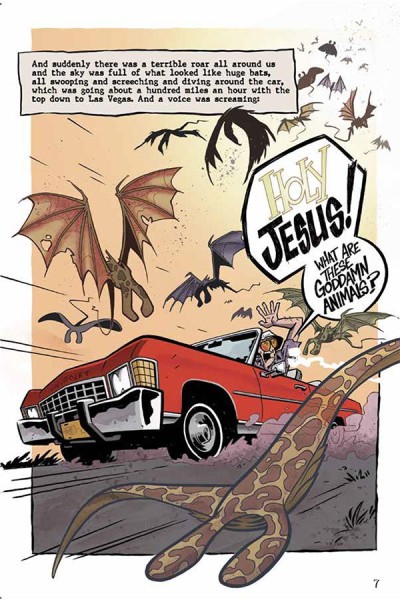Overly Sarcastic Productions
Published 22 Jul 2014Sorry it’s been a while. Summer vacation plays merry hell with both my work ethic and my voice. *discreetly hacks up a lung*
King Lear! He’s not a very good king, and he’s not a very good father! Good thing that, by the end, he’s neither of those things.
April 16, 2021
Shakespeare Summarized: King Lear
April 13, 2021
Was it REALLY the WAR of NORTHERN AGGRESSION?!?!?!
Atun-Shei Films
Published 28 Apr 2020Checkmate, Lincolnites! Debunking the Lost Cause myths that Abraham Lincoln was a tyrant, that nobody in the North cared about slavery or abolitionism, and that the warmongering Union invaded the South without provocation or just cause during the Civil War. Featuring some special guest appearances from your favorite kooky historical characters!
[Update, 8 Feb, 2023: Here’s a Vlogging Through History reaction video that amplifies several of the points Atun-Shei makes – https://www.youtube.com/watch?v=rTQzXG15QsU]
(more…)
April 10, 2021
Miscellaneous Myths: Loki
Overly Sarcastic Productions
Published 9 Apr 2021I started researching this goddamn video in june of 2019. I was so young. So innocent. This video is a precious relic of The Before Times, and unlike those inconsiderate vikings, I went out of my way to take *actual notes!*
Our content is intended for teenage audiences and up.
PARTIAL TRACKLIST: Starfall, Hall Of The Mountain King, Sky Becomes Water, Flight Of The Silverbird, Lacrimosa, Reign Of Vengeance, He Who Brings The Night
“Scheming Weasel” Kevin MacLeod (incompetech.com)
Licensed under Creative Commons: By Attribution 3.0
http://creativecommons.org/licenses/b…“Elevator” Kevin MacLeod (incompetech.com)
Licensed under Creative Commons: By Attribution 3.0
http://creativecommons.org/licenses/b…PATREON: https://www.Patreon.com/OSP
PODCAST: https://overlysarcasticpodcast.transi…
DISCORD: https://discord.gg/osp
MERCH LINKS: http://rdbl.co/osp
OUR WEBSITE: https://www.OverlySarcasticProductions.com
Find us on Twitter https://www.Twitter.com/OSPYouTube
Find us on Reddit https://www.Reddit.com/r/OSP/
April 8, 2021
The Weird Years of The Simpsons (1989-1994)
J.J. McCullough
Published 2 Jan 2021The show struggled for five years to figure out what kind of show it wanted to be, and how to treat its characters. It could have been much weirder than it was.
FOLLOW ME:
Support me on Patreon! https://www.patreon.com/jjmccullough
Join my Discord! https://discord.gg/3X64ww7
Follow me on Instagram! https://www.instagram.com/jjmccullough/
Read my latest Washington Post columns: https://www.washingtonpost.com/people…
Visit my Canada Website http://thecanadaguide.com
HASHTAGS: #tv #animation
April 6, 2021
QotD: Rap music
I would like to think that nothing human is alien to me (as the Roman playwright and former slave Terence put it), but it is not quite true. I draw the line, for example, at rap music, which always puts me in mind of experiments I witnessed during physiology classes fifty years ago, in which electrodes were placed in the amygdala of cats and stimulation of which caused a reaction of insensate and undirected rage (in the cat). To change the analogy slightly, rap music is the noise that hornets, if they could vociferate, would make when their nest was disturbed.
Theodore Dalrymple, “Liars and Maligners”, Taki’s Magazine, 2020-11-13.
April 5, 2021
QotD: NYC goes out of its way to “afflict the comfortable”
In July, the city moved 700 homeless single men into hotels on the densely populated and famously tolerant Upper West Side, purportedly as a response to the pandemic. Residents were stunned to find their neighborhood turned overnight into a skid row, with nonstop open drug sales and drug use, public sex acts, and rampant street harassment of women and girls. During a contentious local community board Zoom meeting about the issue, Erin Drinkwater, a deputy commissioner of intergovernmental and legislative affairs at the Department of Social Services, spoke blandly about the need for “compassion” and implied that the concerned neighbors were racist for opposing the city’s move. Following the meeting, Drinkwater tweeted “Comfort the afflicted; afflict the comfortable.” When asked what she meant by this, she said that it was a quotation from the Bible’s Book of James, and that it spoke to her sense of mission.
One might ask why a social-services functionary in New York City would cite the Bible in defense of public policy — except that the quotation is not even from the Bible. In fact, it is from Finley Peter Dunne, a popular Chicago columnist from the 1890s who invented a humorous character named “Mr. Dooley,” an Irish bartender who delivered his wisdom in dialect.
The original quotation, in which Mr. Dooley described the function of the newspaper: “Th’ newspaper does ivrything f’r us. It runs th’ polis foorce an’ th’ banks, commands th’ milishy, controls th’ ligislachure, baptizes th’ young, marries th’ foolish, comforts th’ afflicted, afflicts th’ comfortable, buries th’ dead an’ roasts thim aftherward.” Somehow, in a bizarre game of “cultural telephone,” this mock-sonorous fiddle-faddle has gathered the effulgence of holy writ for progressives, who take it as descriptive of their “joyous responsibility.”
On the one hand, it’s comical that this scrap of tabloid wit is taken so gravely by self-righteous officials. Properly speaking, isn’t it their job to make people more comfortable, not to diminish comfort? But on the other hand, it’s frightening to consider that New York is now run by progressive militants who appear to believe that their vocation is to “afflict” their constituents by disrupting their undeserved calm and comfort. Mass immiseration is not a side effect of bad policy; it is the policy.
Seth Barron, “The Politics of Affliction”, City Journal, 2020-12-17.
April 2, 2021
QotD: Sex and the grad student lifestyle
For normal women, getting laid is a two-step process:
- Show up; and
- Bring beer.
For 75-90% of women under 40, step 2 is optional. It would’ve been for Chloe. Especially in a bar full of grad students, who despite their extensive academic training on “the rhetorics of hegemony” and whatnot, still aren’t quite sure how the naughty bits fit together. She might’ve had to draw the guy a map, but surely that’s no problem for someone so assertively in control of her own sexuality as was Chloe …
And that’s just normal people, who know what pronouns to use and never hesitate when choosing a public restroom. The real freakazoids actually have it much easier, since loudly proclaiming a deviant sexuality is a status symbol in the ivory tower. Perhaps your deepest, most secret fetish involves cocktail onions and a Shop-Vac … and let me stop you right there, I do NOT wanna know, I’m only bringing this up to say that hey, I sympathize, love is real and you’re having a hard time finding yours.
You should consider academia, my friend, where not only are such things not shameful, but they’re positively celebrated. If you’ve actually got video of yourself doing the nasty under those conditions, they’ll pretty much hand you a PhD in Performance Art on the spot …… and yet, nobody does.
I’m not saying people don’t have sex in grad school. If I myself wasn’t getting my ashes hauled every day in the ivory tower, I assure you it wasn’t for lack of trying. What I am saying is that academia is the only place on earth where not only is your fetish — whatever it is — not shameful, but easily satisfied. Those of us who actually enjoy the missionary position with committed partners of the opposite-sex used to joke that ours was the only sexual deviancy so perverse, you’d be shunned by all your colleagues if you admitted to it. These people, on the other hand, talk like their gonads rule their lives, but they never actually do anything about it.
I have no idea why, but finding out would tell us a lot about the psychology of the average Leftist.
Severian, “Gettin’ Busy in College Town”, Rotten Chestnuts, 2020-12-04.
April 1, 2021
How to Make Preserved Lemons in the Workshop
Uri Tuchman
Published 12 Jul 2019Preserved lemon recipe:
For the lemons:
– 6 lemons
– 300 gram salt
Cutting board:
– 40x25x1.5 cm cherry wood
Knife:
– 20x5x0.2 cm O1 steel
– 10x3x2 cm Maple wood
– 4x3x2 cm walnut wood
Airtight container:
– 14x14x1.5 cm cherry wood x2
– 10x14x1.5 cm cherry wood x4
– brass screw rod x8
– brass thumb nut x8
Serving board
– 20x6x1.5 cm beech wood
– 6x1x0.5 cm walnut
Fork:
– 6x1x0.2 cm brass plate
– 1cm brass tube
– 10 wooden handle from some nice burlMix everything in a bowl and you’re golden!
Patreon: https://www.patreon.com/urituchman
Instagram: https://www.instagram.com/urituchman/Music:
Acid Trumpet
Kevin MacLeod
incompetech.com)
Licensed under Creative Commons: By Attribution 3.0 License
http://creativecommons.org/licenses/b…
QotD: Mistakes
Show us a man who never makes a mistake and we will show a man who never makes anything. The capacity for occasional blundering is inseparable from the capacity to bring things to pass.
Herman Lincoln Wayland
March 29, 2021
The Bayeux Tapestry – all of it, from start to finish
Lindybeige
Published 18 Oct 2017A complete guide to the story as depicted on the famous Bayeux Tapestry. There is a lot more to it than just the Battle of Hastings.
Support me on Patreon: https://www.patreon.com/Lindybeige
Other than The Adventures of Stoke Mandeville, this is the longest editing job I have ever done. It took eleven very long days of work to put this together from the opportunist footage I snatched when changing trains near the museum where it is on display. The shoot was not without its problems, one of which was the fact that because the tapestry is behind glass, and the museum has many illuminated displays, the reflections in the glass were a bane, and I didn’t manage to get rid of them all. Another was that my stills camera refused to work after taking a small number of pictures. It had always worked fine before, and has always worked fine since. It wasn’t the battery and it wasn’t the SD card. It was a mystery.
For the curious, the edit involved seventeen tracks on the timeline, and has twenty-two animated scenes. Unfortunately, the main animation software I was using could not handle full HD images, and so there is a slight loss of picture quality during most of the animated scenes. You will notice that the close-ups have a better picture quality than the wide shots. This is because they were taken with the camera pushed up against the glass, which improved focussing, and got rid of almost all of the haze and reflections caused by the glass.
It is important to understand that this ‘tapestry’ is a piece of propaganda, and does not tell an accurate version of events. The story I tell here is the one depicted, not what actually happened.
I have enough material for more videos on the tapestry, but am in no great hurry to spend many more days editing this difficult footage. Trying to match the writing and speaking of narration to panning camerawork that had no notion when shot of what might need to be said about some passing scene, was a nightmare, and many editing compromises had to be made, with some scenes skipped past quickly, and others drawn out.
Clarification on the nudity: I said that the figure under the mysterious Cleric and woman was the the only figure displaying genitals on the tapestry. This was misleading. Several animals clearly are pictured with genitals, and on the tapestry in Bayeux today it looks as though a couple of other human figures have genitals. Some of these may have been added later, and these are not being ‘displayed’ as the displaying figure is clearly doing, but look more incidental.
I describe the tall figure emerging from the building with a lance and pennant, being brought his horse, as “William”. It occurred to me after making the video that all the sources I consulted describe this figure as William, but the text does not name him as William, so possibly he is just a Norman knight, representing any and all of the knights setting out for the battle, and that this figure is meant to be “William” could be a modern tradition that has become accepted fact just by repetition.
Buy the music – the music played at the end of my videos is now available here: https://lindybeige.bandcamp.com/track…
Lindybeige: a channel of archaeology, ancient and medieval warfare, rants, swing dance, travelogues, evolution, and whatever else occurs to me to make.
▼ Follow me…
Twitter: https://twitter.com/Lindybeige I may have some drivel to contribute to the Twittersphere, plus you get notice of uploads.
website: www.LloydianAspects.co.uk
March 28, 2021
TARIFFS and TAXES: The REAL Cause of the CIVIL WAR?!
Atun-Shei Films
Published 16 Jan 2020Checkmate, Lincolnites! Debunking the Lost Cause myth that the American Civil War was fought over taxes and protectionist tariffs. Was the South subjected to disproportionate taxation? Did the Morrill Tariff cause secession? Watch and find out, you no-account, yellow-bellied sesech!
Support Atun-Shei Films on Patreon ► https://www.patreon.com/atunsheifilms
Leave a Tip via Paypal ► https://www.paypal.me/atunsheifilms (All donations made here will go toward the production of The Sudbury Devil, our historical feature film)
Buy Merch ► teespring.com/stores/atun-shei-films
#CheckmateLincolnites #CivilWar #AmericanHistory
Reddit ► https://www.reddit.com/r/atunsheifilms
Twitter ► https://twitter.com/atun_shei
March 27, 2021
QotD: The best bar in the world
An Irishman, an Italian, and an Iowan are arguing about which bar is the world’s best. “The best bar in the world is Paddy’s Pub in County Cork,” says the Irishman. “After you’ve bought two drinks at Paddy’s, the house stands you to a third.” “That’s a good bar,” says the Italian, “but not as good as Antonio’s in Old Napoli. At Antonio’s, for every drink you buy the bartender buys you another.” “Now, those sound like mighty fine bars,” says the Iowan, “but the best bar in the world is Bob’s Bar and Grill in Des Moines. When you go into Bob’s you get three free drinks and then you get to go in the back room and get laid.” The Irishman and the Italian are astonished to hear this, but they are forced to admit that Bob’s Bar and Grill must indeed be the best bar in the world. Suddenly, however, the Italian gets suspicious. “Wait a minute,” he says to the Iowan. “Did that actually happen to you personally?” “Well, no, not to me personally,” admits the Iowan. “But it actually happened to my sister.”
Steve Stewart-Williams, “Keeping It Casual”, Quillette, 2018-10-14.
March 25, 2021
Hunter S. Thompson’s Fear and Loathing in Las Vegas
I first read Thompson’s Fear and Loathing in the late 1970s and being as callow and inexperienced as most teenagers, I took it for a mostly factual exploit (along with many older readers who didn’t have my excuse for gullibility). I passed the book on to one of my friends who became mildly obsessed with “Raoul Duke” and the adventures recounted in the book. I’ve long since lost touch with him, but I’m sure he’d be horribly disappointed to discover that Thompson probably imagined 90% of it:
We were somewhere around Barstow on the edge of the desert when the drugs began to take hold. I remember saying something like “I feel a bit lightheaded; maybe you should drive …” And suddenly there was a terrible roar all around us and the sky was full of what looked like huge bats, all swooping and screeching and diving around the car, which was going about a hundred miles an hour with the top down to Las Vegas.
From the outset, Fear and Loathing in Las Vegas is an outrageous and darkly amusing tale of two crazed men turned loose in the world’s capital of decadence. Raoul Duke and Doctor Gonzo, clearly based upon Thompson and Acosta, are carrying a veritable pharmacopoeia in the trunk of their rented car, and throughout the novel they abuse a litany of substances as they stumble through casinos, bars, and hotels terrorising staff and patrons alike. Though Duke and Gonzo are, like the real Thompson and Acosta, tasked with covering the Mint 400, their assignment is quickly lost in the carnage. Near the end of the book, Duke admits he “didn’t even know who’d won the race.”
If you are unfamiliar with Thompson’s work, you may wonder why it matters that their efforts to complete a minor assignment ended in failure. Authors like Ernest Hemingway had mined their journalistic experience for material to incorporate into their fiction, so it is hardly unusual that Thompson would find inspiration for a novel whilst covering the Mint 400. But his approach with this book went beyond mere inspiration. Throughout Fear and Loathing, reality and imagination are blurred to the extent that no one really has much idea of what really happened on their trip.
[…]
In this letter, he made the startling confession that Fear and Loathing had not merely exaggerated the debauchery that took place in Vegas, but that there had in fact been no drugs at all. Could this really be true? Was the most notorious drug book of its era really inspired by a drug-free journey?
Before we can answer that, it is important to note the chronology of events on which the book was based. Whilst the book portrays the two men tearing apart hotels and casinos over a period of several days, there were in fact two distinct trips. First, they went to cover the Mint 400 on Mach 21st–23rd, then they returned for the National District Attorneys’ Conference on Narcotics and Dangerous Drugs on April 25th–29th. Thompson simply rolled the two events together into a single narrative. The evidence suggests that, during the first trip, Thompson and Acosta drank heavily and perhaps smoked a little pot, but certainly did no serious drug-taking. The famed pharmacopeia in the trunk of their convertible was fictitious:
The trunk of the car looked like a mobile police narcotics lab. We had two bags of grass, seventy-five pellets of mescaline, five sheets of high-powered blotter acid, a salt shaker half full of cocaine, and a whole galaxy of multi-colored uppers, downers, screamers, laughers … and also a quart of tequila, a quart of rum, a case of Budweiser, a pint of raw ether and two dozen amyls.
As tempting as it is to believe that this existed, it was a product of Thompson’s prodigious imagination. He was, however, keen to keep his readers in the dark, hence his letter to Silberman and the inclusion of his photo on the back cover. Since childhood, he had been obsessed with appearing as an outlaw, yet real outlaws never explicitly said that’s what they were. They merely hinted at it.
Of course, Thompson’s “drug-diet” did consist of various illegal substances, which made his descriptions of their effects rather convincing, but not only did he remain mostly drug-free in Vegas, he also wrote the novel with little more than beer and tobacco in his system. Back home in Colorado, he polished his story carefully through many drafts. The result was a far more intelligent and coherent work than almost anything else he published.
It was only during the second of the two trips that they began to consume drugs, but even then their indulgence was mild when compared with Duke and Gonzo’s extravagant excesses. They had marijuana, a few pills, and possibly some mescaline, but nothing else. His descriptions of LSD came from experiments several years earlier, the parts about adrenochrome were entirely fabricated, and — surprisingly — Thompson had not yet tried cocaine by 1971.
QotD: Lucas, the Prince of Darkness
Joe Lucas — or, more accurately, the company bearing his name — engineered electrical bits for pretty much everything emanating from the UK, and the notorious unreliability of Lucas components played a key role in tanking the British car industry in the early 1980s. Make the jump for “If Lucas made guns, wars would not start,” and other classics.
- The Lucas motto: “Get home before dark.”
- Lucas is the patent holder for the short circuit.
- Lucas — Inventor of the first intermittent wiper.
- Lucas — Inventor of the self-dimming headlamp.
- The three position Lucas switch — Dim, Flicker and Off.
- The Original Anti-Theft Device — Lucas Electrics.
- Lucas is an acronym for Loose Unsoldered Connections and Splices
Andrew Stoy, “Joe Lucas, Prince Of Darkness: British Electrical System Jokes”, Jalopnik, 2008-08-04.
March 21, 2021
QotD: Expressions of love
Love is a delicate plant that needs constant tending and nurturing, and this cannot be done by snorting at the adored object like a gas explosion and calling her friends lice.
P.G. Wodehouse, Jeeves and the Feudal Spirit.









